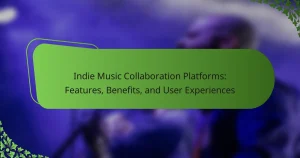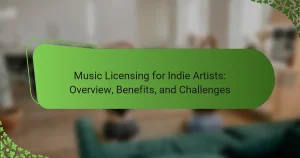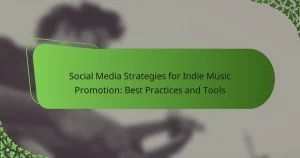Indie musicians often face challenges in accessing industry contacts and resources. This article explores networking opportunities through events like music festivals and conferences, online platforms such as social media and music forums, and strategic tips for building valuable relationships. Engaging with peers and industry professionals can enhance visibility and foster collaborations essential for career growth.
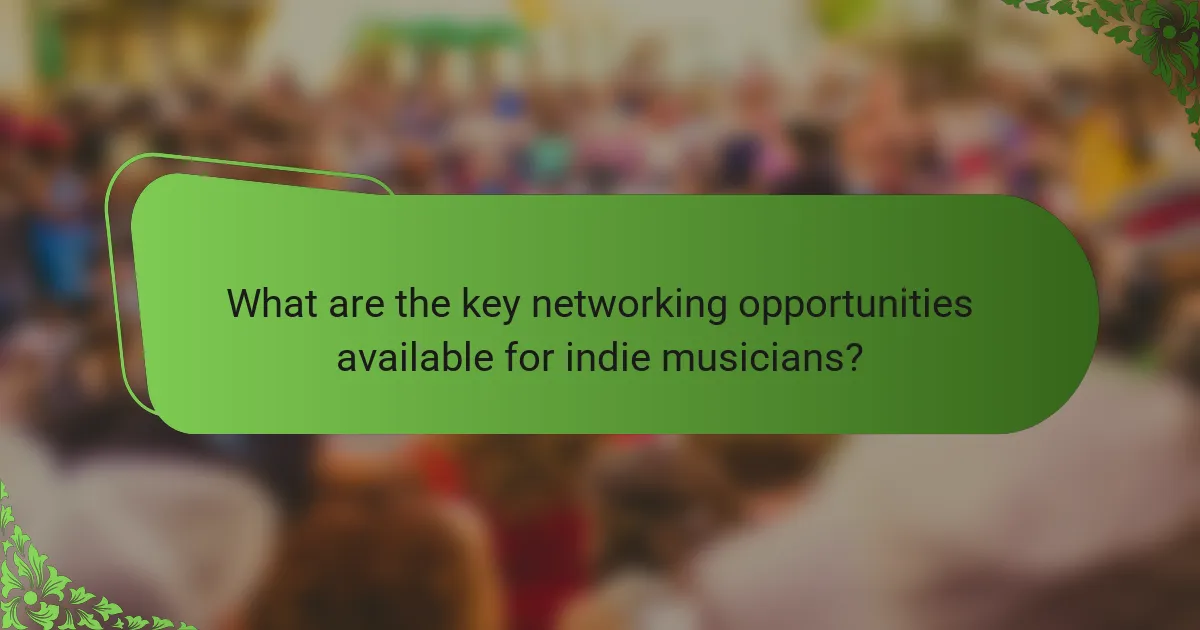
What are the key networking opportunities available for indie musicians?
Indie musicians can leverage various networking opportunities through events, online platforms, and strategic tips. Key opportunities include music festivals, local showcases, social media groups, and music industry conferences. Engaging with online communities can broaden reach and foster collaborations. Building relationships with other artists and industry professionals enhances visibility and opens doors to new opportunities.
How do music festivals serve as networking platforms?
Music festivals provide significant networking opportunities for indie musicians. They facilitate connections with industry professionals, fellow artists, and potential collaborators.
Festivals often include workshops and panels, offering insights into the music business. These events allow musicians to showcase their talent, increasing visibility and attracting interest from record labels and promoters.
By engaging with audiences and other performers, indie musicians can build relationships that may lead to future gigs or partnerships. The shared environment fosters collaboration and creativity, essential for career growth.
Networking at festivals can also enhance social media presence, as artists gain followers and support through interactions. This exposure is vital in an industry where connections often lead to success.
Which conferences are essential for indie musicians to attend?
Essential conferences for indie musicians include South by Southwest, Indie Week, and The Great Escape. These events provide invaluable networking opportunities, industry insights, and exposure to potential collaborators. Attending these conferences can significantly enhance an indie musician’s career trajectory and connections.
What role do local music events play in building connections?
Local music events foster connections by providing platforms for indie musicians to network, collaborate, and gain exposure. These gatherings create opportunities for artists to meet industry professionals, share experiences, and build relationships that can lead to future collaborations. The informal setting encourages genuine interactions, which can enhance a musician’s support network. Engaging in these events also allows artists to showcase their talent, potentially attracting fans and industry attention.
How can online platforms facilitate networking for indie musicians?
Online platforms can significantly enhance networking for indie musicians by providing accessible spaces for collaboration and exposure. These platforms facilitate connections through virtual events, social media, and dedicated music communities.
Websites like Bandcamp and SoundCloud allow musicians to share their work and connect with fans and other artists. Social media platforms such as Instagram and Twitter enable direct interaction, promoting engagement and collaboration. Online events, including virtual open mics and music festivals, create opportunities for musicians to showcase their talent and network with industry professionals.
Additionally, platforms like Meetup help organize local events, fostering in-person connections. Networking tips include engaging actively in discussions, sharing resources, and collaborating on projects to build relationships. Overall, online platforms serve as essential tools for indie musicians to expand their network and enhance their careers.
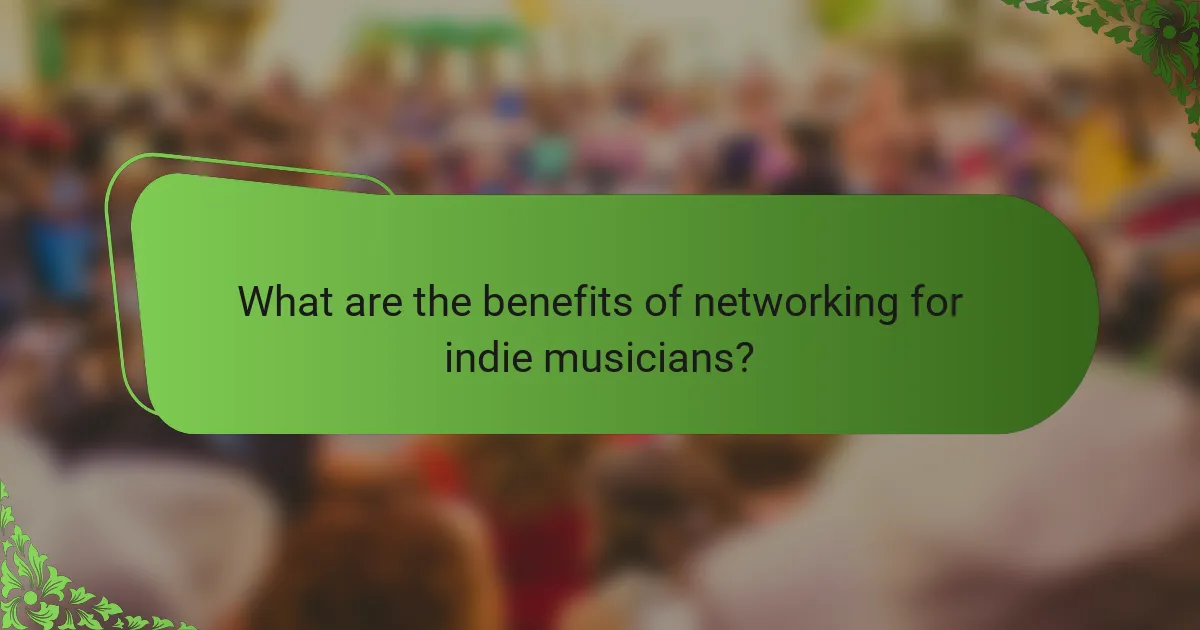
What are the benefits of networking for indie musicians?
Networking offers indie musicians significant benefits, including increased exposure, collaboration opportunities, and access to industry resources. Engaging with other artists and industry professionals can lead to valuable connections that enhance career growth.
Participating in events such as music festivals, open mics, and industry conferences allows musicians to showcase their work and meet potential collaborators. Online platforms, including social media and music-sharing sites, further expand reach and facilitate networking.
Indie musicians can leverage networking tips like actively engaging with peers, sharing experiences, and seeking mentorship. These strategies foster relationships that can lead to gigs, promotional opportunities, and valuable feedback. Building a strong network is essential for navigating the competitive music landscape.
How does networking enhance collaboration opportunities?
Networking enhances collaboration opportunities by connecting indie musicians with industry professionals, peers, and resources. Events such as showcases and workshops facilitate face-to-face interactions, while online platforms allow for ongoing engagement. These connections lead to potential partnerships, joint projects, and increased visibility. By participating in these networking avenues, musicians can leverage their unique talents and build a supportive community that fosters creativity and growth.
In what ways can networking lead to increased visibility and exposure?
Networking can significantly enhance visibility and exposure for indie musicians through various avenues. Engaging in events such as music festivals or industry showcases allows artists to connect directly with potential fans and industry professionals. Utilizing online platforms like social media and music streaming services increases reach and promotes music to broader audiences. Additionally, collaborating with other musicians or influencers can amplify exposure through shared networks. Establishing a strong personal brand and consistently engaging with the community fosters long-term visibility.
What impact does networking have on career growth for indie musicians?
Networking significantly enhances career growth for indie musicians by providing opportunities for collaboration, exposure, and mentorship. Engaging in events such as music festivals, workshops, and industry conferences can lead to valuable connections. Online platforms like social media and music forums further expand reach and audience engagement. Tips for effective networking include being genuine, following up with contacts, and actively participating in community discussions. These strategies foster relationships that can lead to increased visibility and career advancements.
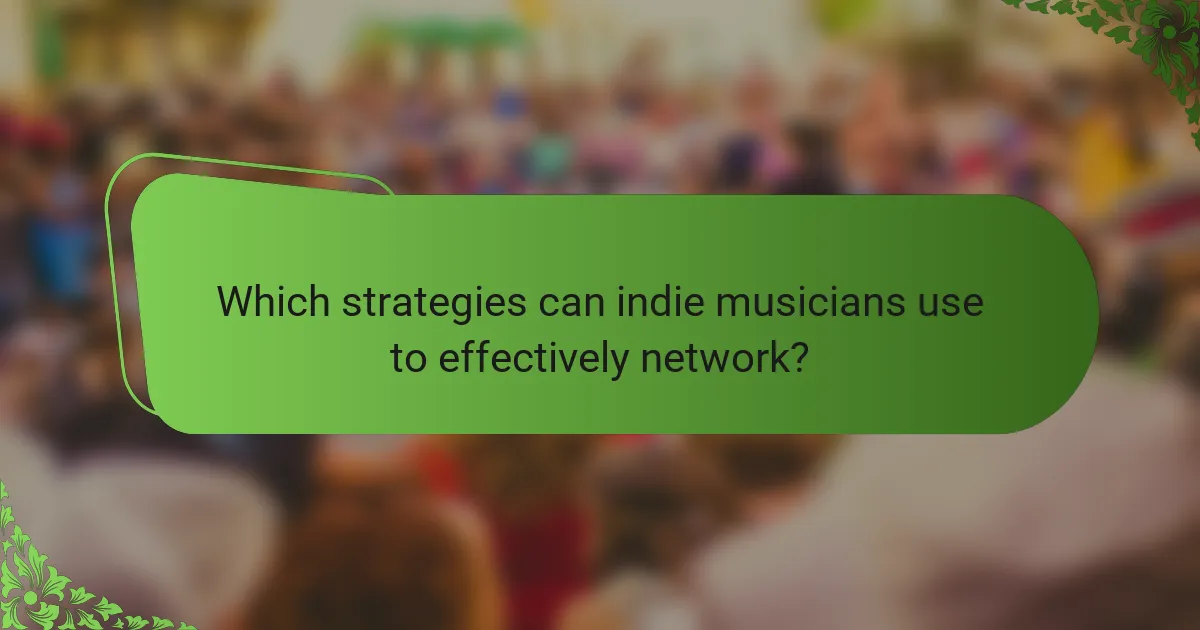
Which strategies can indie musicians use to effectively network?
Indie musicians can effectively network through events, online platforms, and strategic tips. Attending local music festivals and open mics fosters direct connections. Utilizing social media platforms like Instagram and TikTok enhances visibility and engagement. Joining music industry groups on platforms like Facebook or LinkedIn provides valuable connections and insights. Networking tips include being authentic, following up with contacts, and collaborating with other artists to expand reach.
How can social media be leveraged for networking?
Social media can be effectively leveraged for networking by creating connections, promoting music, and engaging with audiences. Indie musicians should utilize platforms like Instagram, Facebook, and Twitter to showcase their work and interact with fans and industry professionals. Participating in online events and collaborations enhances visibility and fosters relationships. Engaging content and consistent posting attract followers and potential collaborators, maximizing networking opportunities.
What are the best practices for engaging with industry professionals?
To effectively engage with industry professionals, indie musicians should prioritize authenticity, build genuine relationships, and leverage various networking platforms. Attend music festivals, workshops, and conferences to connect face-to-face. Utilize social media to showcase work and engage with others in the industry. Follow up after initial meetings to maintain connections. Collaborate with fellow musicians to expand networks and gain exposure. Regularly participate in online forums and communities to share insights and learn from others.
How can indie musicians create meaningful connections at events?
Indie musicians can create meaningful connections at events by engaging authentically and leveraging networking opportunities. Attend industry-specific gatherings to meet like-minded artists and potential collaborators. Utilize social media platforms to promote your presence and connect with attendees before and after the event. Prepare an elevator pitch to succinctly share your music and vision. Follow up with new contacts to nurture relationships and explore future collaborations.
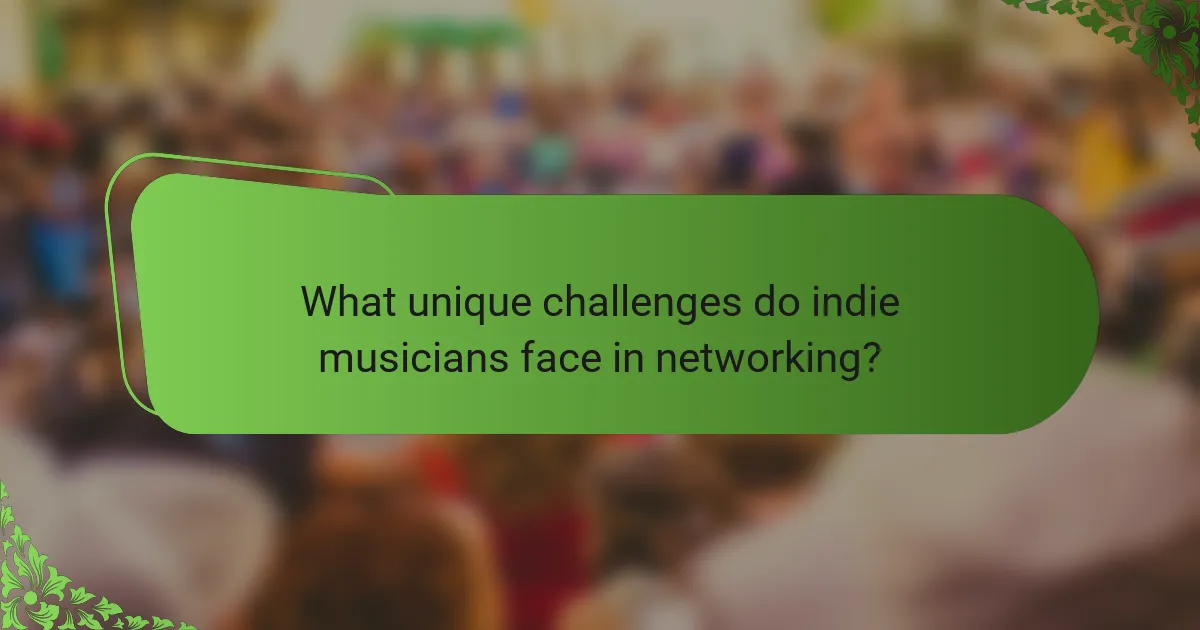
What unique challenges do indie musicians face in networking?
Indie musicians face unique challenges in networking, including limited access to industry contacts and resources. They often lack the marketing budgets of major labels, making it difficult to reach broader audiences. Additionally, indie artists may struggle with self-promotion and navigating social media platforms effectively. Building genuine relationships can be hindered by competition and the oversaturation of the music market. Furthermore, many indie musicians work independently, which can lead to feelings of isolation and difficulty in finding collaborative opportunities.
How does the independent status affect networking opportunities?
The independent status enhances networking opportunities for indie musicians by fostering unique connections. Indie musicians can engage in diverse events tailored to their genre, allowing for collaboration and exposure. Platforms like Bandcamp and SoundCloud specifically cater to independent artists, enabling them to showcase their work without traditional industry barriers. Additionally, indie musicians often benefit from grassroots support, creating a strong community network that can lead to performance opportunities and partnerships. This independence encourages creativity in building relationships, ultimately expanding their reach and influence in the music industry.
What are common misconceptions about networking in the music industry?
Many misconceptions exist about networking in the music industry. A common belief is that networking is solely about making contacts for immediate benefits. In reality, it focuses on building genuine relationships over time. Another misconception is that only established artists can network effectively. Indie musicians can leverage events and online platforms to connect with peers and industry professionals. Additionally, some think networking is only for extroverts. Introverts can also succeed by preparing for interactions and using social media strategically. Finally, many believe networking is a one-time effort. In truth, it requires ongoing engagement and nurturing of connections.
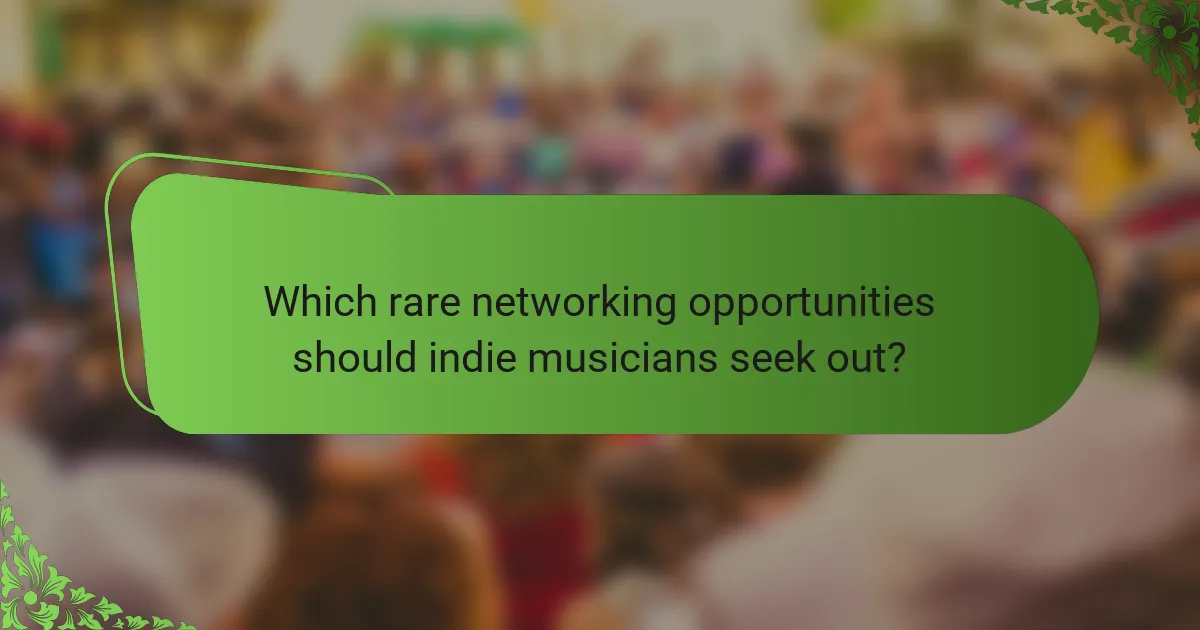
Which rare networking opportunities should indie musicians seek out?
Indie musicians should seek rare networking opportunities at niche festivals, artist residencies, and collaborative workshops. These events foster unique connections and creative exchanges.
Participating in local artist showcases can provide exposure to industry professionals. Additionally, joining genre-specific online communities allows for targeted networking with like-minded musicians.
Engaging in music hackathons offers collaboration with diverse talents while enhancing skills. Exploring opportunities at unconventional venues can lead to unexpected partnerships and audience growth.
Finally, attending music conferences focused on emerging artists can provide invaluable insights and connections that are often overlooked.
How can niche genre events provide unique networking experiences?
Niche genre events offer indie musicians unique networking experiences through targeted connections and shared interests. These events foster an environment where musicians can meet industry professionals, collaborate with like-minded artists, and engage with dedicated fans.
Such events often feature workshops and panels that provide valuable insights into the music business, enhancing professional growth. Additionally, the intimate settings of niche events encourage deeper conversations and relationship-building, which can lead to future collaborations or performance opportunities.
Indie musicians can leverage these unique attributes to expand their networks, gain exposure, and access resources that may not be available at larger, more generalized events.
What exclusive platforms exist for indie musicians to connect?
Exclusive platforms for indie musicians to connect include Bandcamp, SoundCloud, and ReverbNation. These platforms facilitate networking through community features, collaboration tools, and promotional opportunities. Bandcamp allows artists to sell their music directly, fostering fan engagement. SoundCloud offers a sharing community for feedback and collaboration. ReverbNation provides tools for promotion and distribution, enhancing visibility.
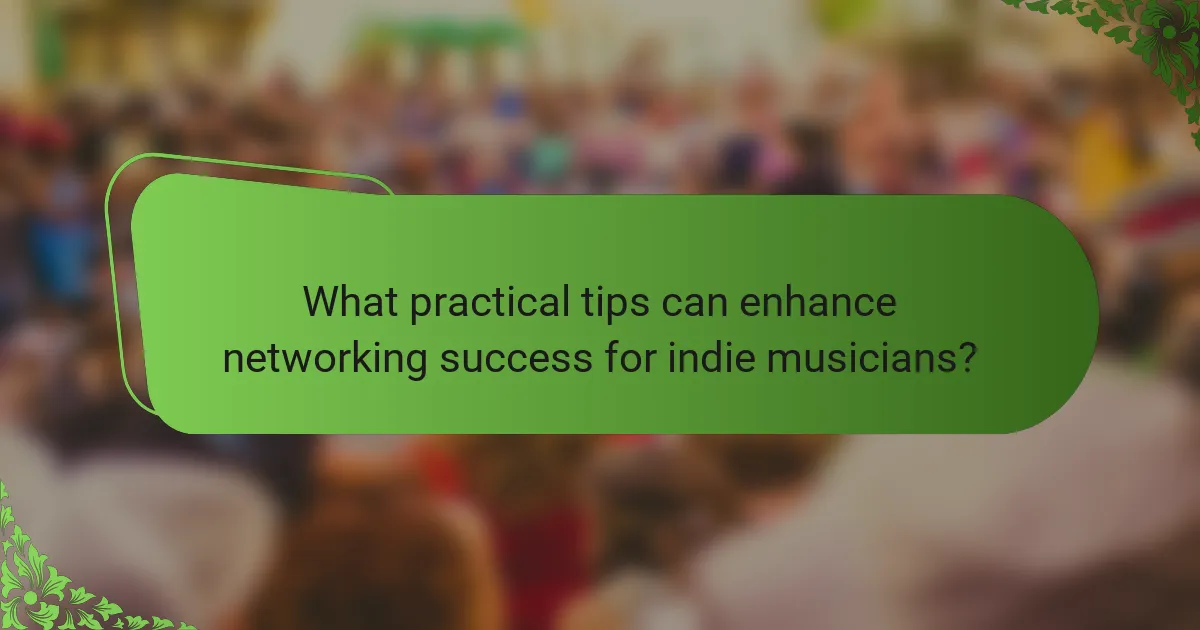
What practical tips can enhance networking success for indie musicians?
To enhance networking success, indie musicians should actively participate in events, utilize online platforms, and follow strategic tips. Engaging in local music festivals or conferences fosters direct connections with industry professionals. Online platforms like social media and music forums offer vast networking opportunities. Additionally, creating a compelling personal brand and consistently reaching out to peers can establish valuable relationships. Collaborating with other artists can also expand visibility and access to new audiences.
How to follow up after networking events effectively?
To follow up effectively after networking events, send personalized messages that reference your conversation. This builds rapport and keeps you top of mind.
1. Send a thank-you email within 24 hours.
2. Mention specific topics discussed to personalize your message.
3. Offer to connect on social media platforms like LinkedIn.
4. Share relevant resources or opportunities that may interest them.
5. Schedule a follow-up meeting if appropriate.
What common mistakes should indie musicians avoid in networking?
Indie musicians should avoid being overly self-promotional, neglecting genuine connections, and failing to follow up after initial meetings. Prioritize building relationships over simply seeking opportunities. Focus on engaging with others authentically, as this fosters long-term networking success. Additionally, be mindful of choosing the right platforms and events that align with your musical style and goals.
